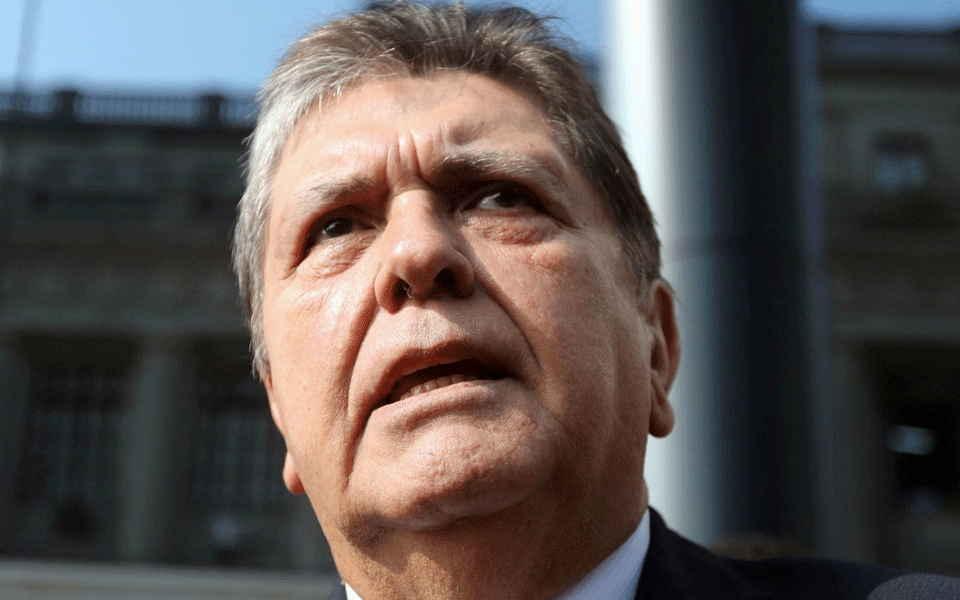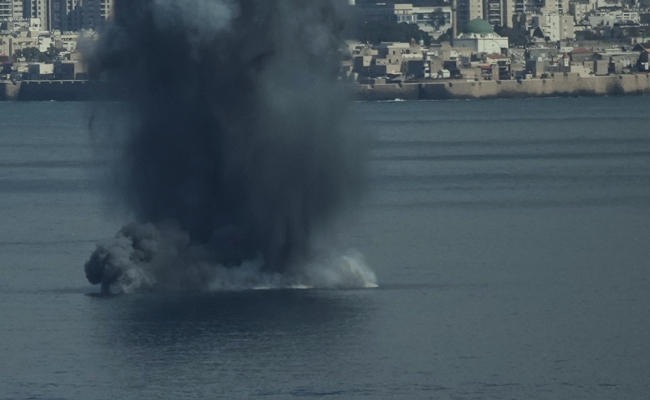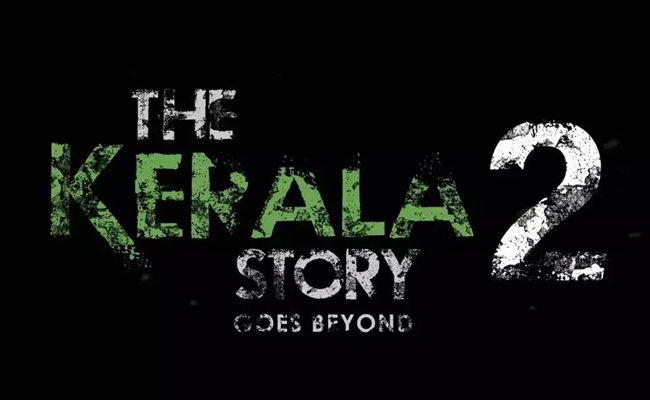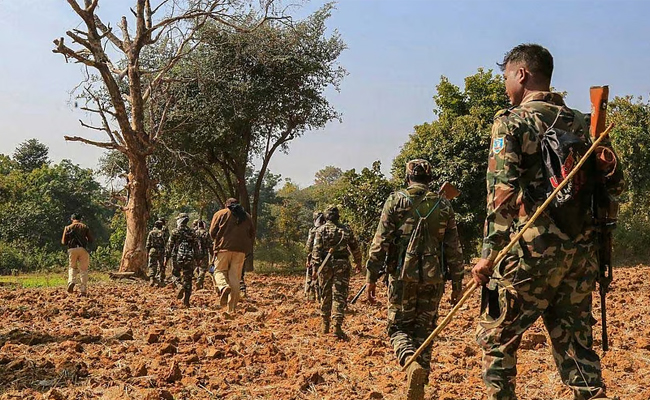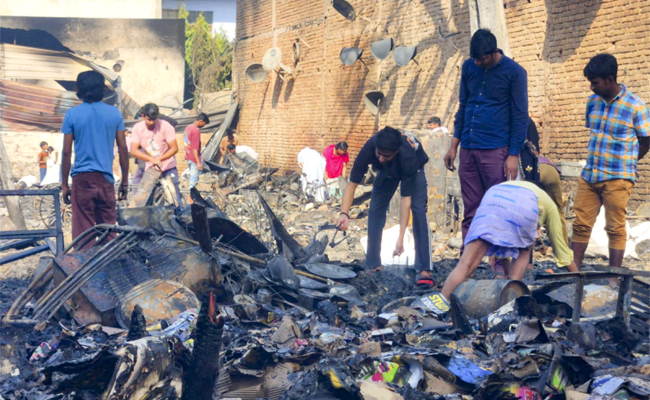Lima: Peru's former president Alan Garcia died in hospital on Wednesday after shooting himself in the head at his home as police were about to arrest him in a sprawling corruption case, a party official said. He was 69.
"Alan Garcia has died, long live Apra," said Omar Quesada, the general secretary of Garcia's American Popular Revolutionary Alliance (Apra) party.
Garcia was resuscitated three times after suffering cardiac arrest while undergoing emergency surgery, before finally succumbing, Peru's Health Minister Zulema Tomas had said.
The Casimiro Ulloa Emergency Hospital in Lima earlier confirmed he had suffered "a bullet wound to his head." "This morning there was a regrettable accident: the president took the decision to shoot himself," Erasmo Reyna, Garcia's lawyer, told reporters outside the hospital after Garcia was admitted.
The attempted arrest took place at 6:30 am (1130 GMT) at Garcia's home in Lima's upmarket Miraflores neighborhood.
Police were acting on an arrest warrant for money laundering that would have allowed Garcia to be held for 10 days, giving authorities time to gather evidence and prevent him from fleeing, the prosecutor's office said.
Peru's President Martin Vizcarra expressed his sympathy on his Twitter account.
"Dismayed by the death of ex-president Alan Garcia. I send my condolences to his family and loved ones," Vizcarra wrote in a tweet.
Garcia, who was president from 1985-90 and again from 2006-11, was suspected of having taken bribes from Brazilian construction giant Odebrecht in return for large-scale public works contracts.
In November, he sought refuge in the Uruguayan Embassy after a court ordered him not to leave the country for 18 months.
He applied for asylum but following 16 days in the embassy he left when his request was denied. Garcia, a social democrat, claimed to be the target of political persecution, an accusation denied by centrist Vizcarra.
On Tuesday, Garcia said he would neither try to flee nor hide again.
In recent weeks, Garcia insisted that "there is no statement, evidence or deposit that links me to any crime and even less so with the Odebrecht company or the execution of any of its projects." Although under investigation by the public prosecutor's office, Garcia had not been charged with anything.
He was one of four Peruvian ex-presidents embroiled in various corruption scandals -- alongside Pedro Pablo Kuczynski (2016-18), Ollanta Humala (2011-16) and Alejandro Toledo (2001-06).
Kuczynski, who is accused of money laundering and was being held under a 10-day preliminary detention until April 20, was also taken to hospital on Wednesday suffering from high blood pressure.
The 80-year-old was being treated in intensive care and had a cardiac catheter fitted, lawmaker Gilbert Violeta said.
Toledo faces extradition from the United States, having been charged with taking a 20 million Odebrecht bribe. Odebrecht has admitted paying 29 million in bribes to Peruvian officials over three administrations.
Some of those payments were allegedly made during Garcia's second term in office to secure a contract to build the Lima metro.
Peruvian press reports also claim Garcia received a 100,000 payment from an illicit Odebrecht fund for giving a speech to Brazilian business leaders in Sao Paulo in May 2012.
Prosecutors allege that Garcia and 21 other officials conspired to enable Dutch company ATM Terminals to win a 2011 concession to operate a terminal at the port of Callao, near Lima.
Another ex-president, Alberto Fujimori (1990-2000), is serving a 25-year sentence for crimes against humanity and corruption.
His daughter, opposition leader Keiko Fujimori, is being held in pre-trial detention for up to three years, accused of accepting 1.2 million in illicit party funding from Odebrecht for her 2011 presidential campaign.
Let the Truth be known. If you read VB and like VB, please be a VB Supporter and Help us deliver the Truth to one and all.
Dubai (AP): Iran launched a new wave of attacks Thursday morning at Israeli and American bases and threatened that the United States would “bitterly regret” torpedoing an Iranian warship in the Indian Ocean and a religious leader called for “Trump's blood,” while Israel said it had begun a “large-scale” attack on Tehran.
Israel announced multiple incoming missile attacks and air sirens sounded in Tel Aviv and Jerusalem. Iranian state television said additional strikes also targeted US bases. The Israeli military said it launched targeted attacks in Lebanon at the Iranian-backed Hezbollah militant group a “large-scale wave of strikes against infrastructure” in Iran's capital, without elaborating. Explosions were heard in multiple locations in Tehran a short time later.
The US Navy sank the Iranian frigate IRIS Dena Tuesday night in the Indian Ocean, killing at least 87 Iranian sailors, which Iranian Foreign Minister Abbas Araghchi decried Thursday as “an atrocity at sea.”
“Frigate Dena, a guest of India's Navy carrying almost 130 sailors, was struck in international waters without warning,” he wrote on social media. “Mark my words: The US will come to bitterly regret (the) precedent it has set.”
Ayatollah Abdollah Javadi Amoli, in one of the few clerical statements so far from Iran, said the country was “on the verge of a great test” and called on state television for "the shedding of Zionist blood, the shedding of Trump's blood.”
"Fight the oppressive America, his blood is on my shoulders,'” he said in a rare call for violence from an ayatollah, one of the highest ranks within the clergy of Shiite Islam.
The US and Israel launched the war Saturday, targeting Iran's leadership and killing Iranian Supreme Leader Ayatollah Ali Khamenei, as well as its missile arsenal and nuclear program. Leaders have suggested that toppling the government is a goal, but the exact aims and timelines have repeatedly shifted, signalling an open-ended conflict.
The war has killed more than 1,000 people in Iran, more than 70 in Lebanon and around a dozen in Israel, according to officials in those countries. It has disrupted the supply of the world's oil and gas, snarled international shipping and stranded hundreds of thousands of travellers in the Middle East.
Threats expanding across the Middle East
----------------------------------------------
Countries around the region braced for potential dangers Thursday, a day after Iran's paramilitary Revolutionary Guard threatened “the complete destruction of the region's military and economic infrastructure.”
Qatar's Interior Ministry said authorities were evacuating residents near the US Embassy in Doha as a temporary precaution, without providing further details.
Fighter jets could be heard overhead in the United Arab Emirates city of Dubai and Saudi Arabia said it destroyed a drone in its province bordering Jordan.
A new attack off the coast of Kuwait appeared to expand the area where commercial shipping was in danger.
An explosion rocked the area early Thursday, according to the United Kingdom Maritime Trade Operations Centre run by the British military. It said a tanker apparently came under attack, but the agency did not offer a cause. Iran in the past has attacked ships by attaching limpet mines to them.
Prior attacks since fighting began Saturday have happened in the Gulf of Oman and the Strait of Hormuz, which connects it to the Persian Gulf and through which about a fifth of the world's oil is shipped.
US stocks rebounded Wednesday after oil prices stopped spiking and reports gave encouraging updates on the American economy. But oil prices resumed their ascent early Thursday and Brent crude, the international standard, is now up some 15 per cent from the start of the conflict as Iranian attacks have disrupted traffic through the strait.
Buildings of Iranian military and security forces targeted
-------------------------------------------------------------
US Defence Secretary Pete Hegseth said a torpedo from an American submarine sank an Iranian warship Tuesday night in the Indian Ocean.
Sri Lankan authorities said 32 crew members were rescued, while its navy recovered 87 bodies.
The Iranian ship was on its way back from participating in a February exercise hosted by the Indian navy. The US Navy also participated in the same exercise with a P-8A Poseidon aircraft, which is employed for anti-submarine and anti-surface warfare as well as surveillance and reconnaissance.
Shifting timelines for US operations
---------------------------------------
During his Pentagon briefing, Hegseth did not give a definitive timeline for US operations, which Trump has said could last for a month or longer.
“You can say four weeks, but it could be six. It could be eight. It could be three,” Hegseth said. “Ultimately, we set the pace and the tempo. The enemy is off balance, and we're going to keep them off balance.”
US and Israeli military officials say launches from Iran have declined as their attacks have taken out ballistic missiles, launchers and drones. Israel's Homefront Command announced it was easing restrictions that closed workplaces nationwide. It said workplaces could reopen Thursday if there is a shelter nearby. Schools would remain closed.
Still, explosions sounded early Thursday in Israel, which said its defensive systems were moving to intercept at least three waves of Iranian missiles.
At least 1,045 people have been killed in Iran, the country's Foundation of Martyrs and Veterans Affairs said Wednesday. Eleven people have died in Israel. Six US troops have been killed, including a major whose identity was released Wednesday.
Another eight people were killed in Lebanon, including two in a building struck by the Israeli military in the Beddawi refugee camp in the coastal city of Tripoli on Thursday and three on a coastal highway, authorities said. The Israeli military did not immediately say who it targeted in the strikes.
In two near-simultaneous Israeli drone strikes in Beirut's southern suburbs late Wednesday, two vehicles were hit, killing three people and wounding six, the health ministry said. The Israeli military said it targeted a Hezbollah member, adding that further details would follow.
Israel's military also said it had hit “several command centres” used by Hezbollah in Beirut and showed video footage of a building being hit, but provided no further details.
Iran's clerics are choosing a new supreme leader
------------------------------------------------------
Iran's leaders are scrambling to replace Khamenei, who ruled the country for 37 years. It is only the second time since the 1979 Islamic Revolution that a new supreme leader is being chosen.
Potential candidates range from hard-liners committed to confrontation with the West to reformists who seek diplomatic engagement. Mojtaba Khamenei, Khamenei's son, has long been considered among them, though he has never held a government position.
In a sign that Iran's leadership will only seek to consolidate its power, the head of the judiciary warned that “those who cooperate with the enemy in any way will be considered an enemy.”
Israeli Defence Minister Israel Katz said on X that Iran's next supreme leader “will be a target for elimination” if he continues to threaten Israel, the US and others.

